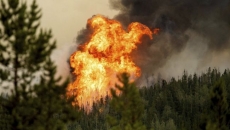Canada's greenhouse-gas emissions will be 12 per cent lower in 2030 with carbon pricing in place than they would be if it was scrapped, new federal data published Thursday suggest.
The data also show that the pricing system for consumers and big industry in place could cause Canada's GDP to take a $25-billion hit at the end of the decade — 0.9 per cent below what it would be without the carbon price.
Environment Minister Steven Guilbeault published the data amid accusations the government was hiding its own analysis of carbon pricing.
You don’t need to be a mathematician to be a leader, but you should probably know some basic math.
— Steven Guilbeault (@s_guilbeault) June 13, 2024
⁰Pollution pricing works: it builds a cleaner economy, holds big polluters accountable & returns more money to 8/10 Canadians.⁰⁰Empty slogans don’t add up to a real climate plan. pic.twitter.com/Yuq6bkdUQT
It came out on Thursday just minutes before the Conservatives tabled a motion in the House of Commons demanding that the federal Liberals produce it.
The government has been reluctant to share the data because the numbers don't compare the cost of carbon pricing with the cost of climate change itself. They also don't factor in the potential for economic growth from climate investments.
Guilbeault said the data are specific to what parliamentary budget officer Yves Giroux requested to redo his analysis of carbon pricing, after admitting earlier this spring that his original findings were flawed.
"It is important to recognize that the data published today does not represent a comprehensive economic overview of the impacts of carbon pricing," Guilbeault said.
"Instead, it is background data related to a specific request from the PBO, which was then used to develop some of their analysis."
For example, he said, it doesn't contain details on the economic benefits of the $15 to $25 billion invested in fighting climate change every year, or the benefits to the economy of slowing the pace of that change.
It also doesn't look at the economic impact of the Canada Carbon Rebate, which this year is expected to return $11 billion to Canadian families to offset how much they pay in carbon pricing.
"Those things are not part of the analysis because the parliamentary budget officer did not ask us for (that) information," Guilbeault said.
The data became a hot topic last week after Giroux accused the government of hiding it, saying they gave it to him under orders he not disclose it.
That allegation came during a tense exchange, as Giroux was defending his office following an admission that it made a major mistake in its carbon pricing analyses, which have been a key part of the debate on whether carbon pricing is effective or too costly.
Giroux's 2022 and 2023 reports both said while carbon rebates exceed the cost of carbon pricing for most Canadians, those benefits are largely erased when the economic impact on jobs and wages is factored in.
However, while the analyses claimed to only be looking at the impact of the consumer carbon price, they also included what is paid by big industry through a separate system.
Giroux said an updated report will be released in the fall, but he didn't think the results will be very different.
When asked why he thought that, he told a parliamentary committee it's because the government has data that proves it but that it won't make public.
That's the data the government released Thursday.
Like Giroux's original report, the modelling takes into account both the consumer and industrial carbon pricing systems.
Consumers, including smaller businesses and entities like hospitals, schools and universities, pay the carbon price — currently $80 per tonne — on all purchases of fossil fuels, including gasoline, natural gas and propane.
Big industrial emitters, like auto factories, oilsands mines and gas power plants, pay the same price per tonne on a portion of their actual emissions.
The Conservatives, who have been campaigning heavily against carbon pricing, devoted most of question period to the numbers Thursday, which they believe prove their point that the policy is economically harmful.
Leader Pierre Poilievre accused Guilbeault of hiding the data to prevent Canadians from knowing the truth.
"The economic vandalism and carbon tax cover-up of this government has now been exposed because of relentless Conservative pressure," Poilievre said.
He demanded Guilbeault's resignation over it.
The data suggest Canada's emissions were already 25 million tonnes lower in 2023 than they would have been without carbon pricing, which Guilbeault said is fully half the emissions cut to date.
The carbon price was $65 per tonne in 2023.
By 2030, when the price hits $170 per tonne, the reduction in emissions is expected to rise to 78 million tonnes, or 12 per cent below what emissions would be without carbon pricing.
Most of that is achieved by industrial sectors, with heavy industry such as factories and metal mines expected to emit 22.4 million tonnes less, with another 27.2 million tonnes shaved off of emissions from oil and gas production.
On the economic side, the data suggest the GDP was about $7 billion lower in 2023 than it would have been without carbon pricing, and that by 2030, the impact will be $25 billion.
Those numbers do not account for the impact climate change is already having on the economy.
A 2022 report by the Canadian Climate Institute found that in 2025, the GDP is expected to be $25 billion lower due to climate change.
Ryan Ness, director of adaptation at the institute, said when governments and businesses are spending money to fix things rather than build new things, it slows productivity.
On top of that, infrastructure damage — such as power outages, bridge collapses and flooded highways — affect productivity, supply chains and trade, he said.
One of the tricky things in all of these data points is that there is no direct correlation showing that if the carbon price stays, climate change is solved more quickly.
"Canada's choices about emissions aren't going to instantaneously stop the increase in floods and wildfires," Ness said. "But it's part of an overall global effort."
He said if we work with other countries to get emissions under control as quickly as possible, the economic impacts of climate change will slow and "eventually flatline."
"If we don't, they continue to rise into the hundreds of billions (of dollars) by the end of the century," he said.





